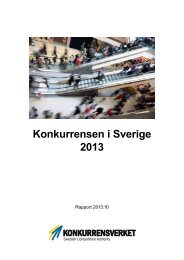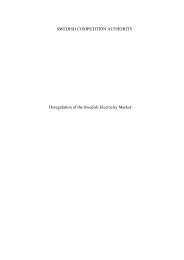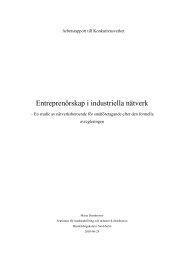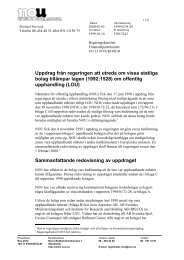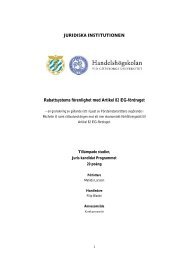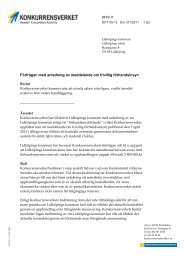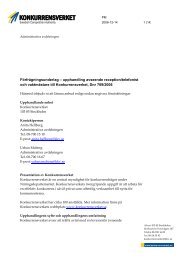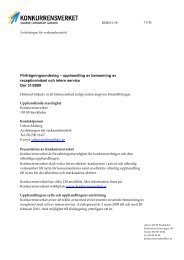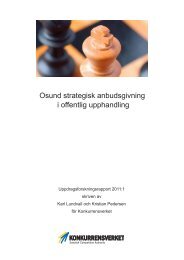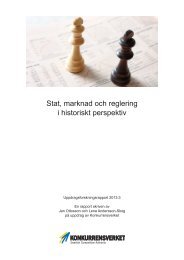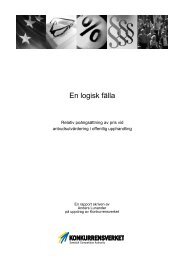Läs rapporten - Konkurrensverket
Läs rapporten - Konkurrensverket
Läs rapporten - Konkurrensverket
You also want an ePaper? Increase the reach of your titles
YUMPU automatically turns print PDFs into web optimized ePapers that Google loves.
8<br />
3. English summary<br />
EC competition law makes a distinction between genuine and non‐genuine<br />
agency agreements. According to current case law, article 81.1 EC is not ap‐<br />
plicable to genuine agency agreements, while non‐genuine agency agree‐<br />
ments are treated as any other vertical agreements in relation to competition<br />
law. Consequently, hard restrictions may be imposed by a principle upon a<br />
genuine agent, whose commercial relationship to its principal is very alike,<br />
that of a subsidiary in a group of companies. However, genuine agents do<br />
not automatically enjoy the single economic entity privilege that applies for<br />
subsidiaries in a group of companies. Notwithstanding the difference in le‐<br />
gal status between subsidiaries and agents, genuine agency agreements can<br />
be regarded to affect competition to the same limited extent as agreements<br />
between companies belong to the same group of companies. Hence, privi‐<br />
leged treatment of genuine agency agreements is motivated by reference to<br />
same effects as those that are a result of agreements within a group of com‐<br />
panies.<br />
In order to be outside the scope of article 81.1 EC, two main criteria must be<br />
fulfilled. The first criterion related to the risk that the agent in incurring for<br />
the commercial activities he undertakes as a result of the agency agreements.<br />
Risk can be divided into financial and commercial risks. A prerequisite for<br />
an agreement to be considered genuine is that the agent should bear none, or<br />
very limited risk. The assessment must be made in relation to the real com‐<br />
mercial situation that agency agreement establishes. The Commission’s<br />
guidelines on vertical restraints consider the risk criterion to be the sole de‐<br />
termining factor for an agreement to be treated as genuine.<br />
Current case law provides, however, for a second and equally important<br />
criterion. The risk criterion is indeed a necessary, but not sufficient criterion.<br />
Hence, in addition thereto, it must be established that the agent is suffi‐<br />
ciently integrated with the principal. One of the most important factors in<br />
relation to integration is that the agent cannot act as an intermediary for<br />
more than one principal – the agency agreement must, therefore, be exclu‐<br />
sive. One of the key reasons to introducing a second criterion in the analysis<br />
is the circumvention of competition rule could be possible. Bearing no risk<br />
does not exclude the possibility of systematically using agency agreements<br />
that – albeit seen individually are genuine – can set aside applicability of<br />
article 81.1 EC on those agreements. As an example, independent dealers<br />
may in such a case enter into agency agreements with all of its suppliers and




